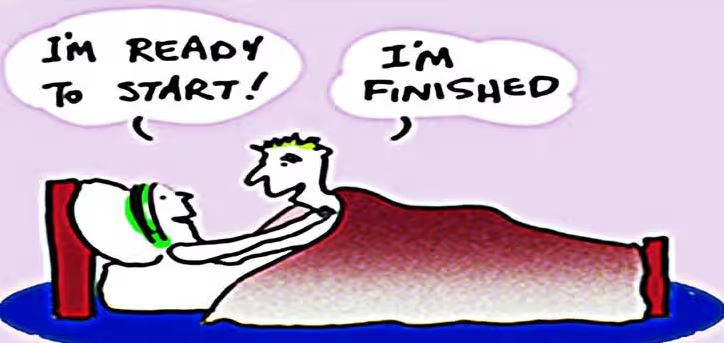What Is Premature Ejaculation?
Premature Ejaculation (PE) is the most common male sexual dysfunction, posing both a diagnostic and treatment challenge for physicians. However, there is currently no universally accepted definition of PE. Currently, the assessment of patients with PE relies mainly on the use of validated questionnaires.
It’s generally accepted that premature ejaculation (PE) is when you orgasm earlier than you want before or during sex. This can be a frustrating or even embarrassing phenomenon.
But it’s a common sexual problem and affects men of all ages. About 30%-40% of people assigned male at birth develop the disorder at some point in their lives. Therefore, if premature ejaculation does not occur frequently, it is not worth worrying about.

Who Is Prone To Premature Ejaculation?
Have you ever wished you could control your erection for a few more minutes? Imagine the possibilities. Imagine her reaction.
Premature ejaculation is often caused by anxiety, other emotional problems, or sexual inexperience and can affect men of any age. This condition is more common in younger men due to lack of sexual experience and control. However, it’s worth noting that this can happen to anyone.
Symptoms Of Premature Ejaculation
Normal antegrade ejaculation is a highly coordinated physiological process, including the ejaculation and expulsion phases, which are controlled by the autonomic nervous system and the somatic nervous system respectively.
There is no set time for ejaculation during sex, but if you ejaculate and get an erection too early, you and your partner may feel like you don’t have enough time to enjoy it.
Premature ejaculation is generally considered to be the delay in ejaculation for more than 3 minutes after penetration and the duration of symptoms for more than 6 months. However, it can happen during all sexual activity, even during masturbation.

What Are The Types Of Premature Ejaculation?
Since the definition of premature ejaculation is not uniform around the world, there is no absolute classification standard. Premature ejaculation can be broadly divided into the following types.
Primary premature ejaculation: also known as lifelong premature ejaculation, starts from the first sexual intercourse and continues throughout life. Always or almost always ejaculate before the penis enters the vagina or within about 1 minute of entering the vagina.
Secondary premature ejaculation: also known as acquired premature ejaculation, is a period of normal ejaculation function before symptoms of premature ejaculation appear, usually due to psychological or environmental factors. The ejaculation latency (that is, the time from insertion of the penis into the vagina to the onset of ejaculation) is significantly shortened, usually less than or equal to 3 minutes.
What Causes Premature Ejaculation?
The causes of PE are traditionally divided into psychological and biological factors.
Psychological Factors
It is generally believed that psychological or mental factors are important factors leading to premature ejaculation (PE). For example: anxiety after rapid ejaculation caused by hasty early sexual experience is an important factor, and persistent psychological factors may also aggravate potential organic factors and cause premature ejaculation. Psychological factors that may play a role include:
Anxiety.
Sexual skills: lack of awareness of effective ejaculation control techniques.
Early sexual experience: hasty and nervous.
Frequency of sexual activity: having sex less frequently.
Sexual arousal: high.
Psychoanalytic Theory: deep-rooted hatred, personality disorders
If you haven’t had sex for a while, you’re more likely to have premature ejaculation.
Biological Factors
Over the past two decades, scientists have proposed numerous biological factors to explain premature ejaculation, including: disorders of the serotonin neurotransmitter in the central nervous system, hypersensitivity of the glans penis, genetic variations, erectile dysfunction, prostatitis, Thyroid disease, etc. However, these causes have not been confirmed by large-scale studies.
What Diseases Should Be Distinguished From Premature Ejaculation?
Erectile dysfunction refers to the inability of the penis to achieve or maintain an erection sufficient for satisfactory sexual intercourse. It can be distinguished from premature ejaculation through the patient’s medical history and symptoms.
It’s important to note that some patients experience premature ejaculation due to psychological stress caused by erectile dysfunction, and the fear of never being able to get an erection again may cause you to end sexual intercourse in a hurry, whether you realize it or not.
Chronic prostatitis is a common disease that seriously troubles patients. The incidence of premature ejaculation is higher among patients with prostatitis. When patients go to see a doctor, they are often diagnosed with chronic prostatitis rather than premature ejaculation.
How To Treat Premature Ejaculation?
If you ejaculate earlier than expected most of the time during sex, talk to your healthcare provider. It’s normal to be shy about talking about sexual health issues. But don’t let this stop you from consulting a medical professional. Premature ejaculation is a common and treatable condition.
Premature ejaculation can be treated with a combination of behavioral counseling, techniques, and medical treatments.
Psychotherapy
The purpose of psychotherapy is to help men develop sexual skills so that they can prolong ejaculation, increase sexual confidence, and reduce anxiety. The second focus is on resolving the patient’s psychological and interpersonal problems, which may arise between men, partners or couples due to premature ejaculation.
Behavioral skills
Start-Stop Technique: Pausing sexual activity to delay ejaculation and gradually increasing the duration.
Squeeze Technique: Applying pressure to the penis to delay ejaculation. You can try these first while masturbating. You can do it with your partner later.
Strengthen your muscles: Weak pelvic floor muscles can sometimes lead to premature ejaculation. Kegel exercises may help strengthen them. Find the right muscles to tighten by stopping urination midway. Press and hold them for 3 seconds, then release for 3 seconds. Do this 10 times, at least 3 times a day.
Wear a condom: It may desensitize you enough so you can last longer.
Medical Treatement
Due to large individual differences, there is no absolute best, fastest, or most effective medication. Except for commonly used over-the-counter medications, the most appropriate medication should be fully combined with individual circumstances under the guidance of a doctor.
Tricyclic antidepressants (TCAs) such as clomipramine, the first antidepressants used to treat premature ejaculation. Currently, antidepressants have limited clinical application in the treatment of premature ejaculation and should be used with caution.
Tramadol. This is a painkiller that delays ejaculation. If antidepressants don’t help, they may be prescribed. This medication is addictive and may not be right for you.
Medications to Treat Erectile Dysfunction. These medications can also help you maintain an erection. They include sildenafil citrate (Viagra), tadalafil (Cialis), or vardenafil hydrochloride (Levitra).
Topical anesthetic. In addition to taking medication, you can also apply a numbing cream or spray to the head of your penis to make it less sensitive. Leave on for about 30 minutes. It must be washed off before intercourse so that you don’t lose your erection or cause your partner to lose consciousness. Local anesthesia is an early treatment method for premature ejaculation. However, large amounts of topical anesthetics may result in inability to achieve an erection, and failure to wear a condom may easily lead to numbness of the partner’s vaginal wall.
When patients feel that they have sexual dysfunction diseases such as premature ejaculation (PE), they should seek medical treatment promptly. They must not conceal the disease and avoid medical treatment to delay the condition.
Can Premature Ejaculation Be Cured?
Most patients with premature ejaculation (PE) have a good prognosis. After targeted treatment of their own organic diseases, ejaculation control and other primary diseases, 90% of patients will achieve a more satisfactory sexual life.
At Last
Male patients suffering from premature ejaculation (PE) often feel anxious, and anxiety will affect the quality of their next sexual life, which will form a vicious cycle in the long run.
Therefore, maintaining an optimistic attitude is of great benefit to the disease, and we must not hide the disease and avoid medical treatment.
Patients should actively understand relevant knowledge, treat premature ejaculation correctly, and carry out treatment under the guidance of doctors and the cooperation of their partners.
